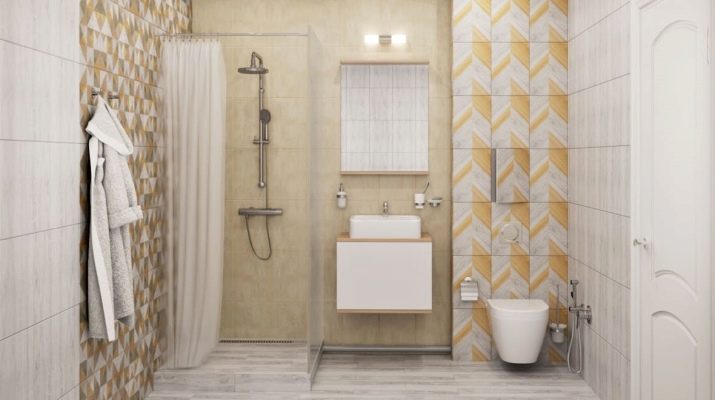Bathroom: design and beautiful examples
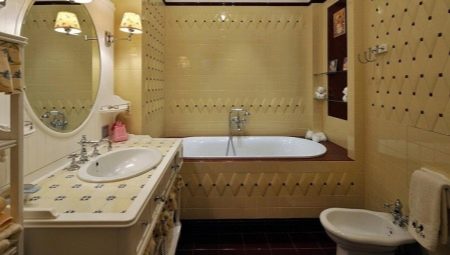
For many people, a bath is not just a place for taking hygiene procedures, but also a small spa corner. However, this can be achieved only with the competent design of the bathroom, the selection of the best suitable finishing materials, plumbing.
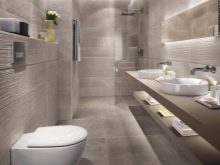
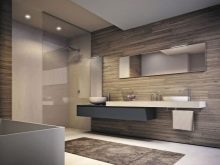
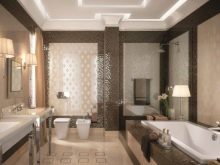
We take into account the dimensions and create a project
When arranging a bathroom first of all, you need to make an accurate measurement. This will allow not only to accommodate all the plumbing and furniture in the bathroom, but also to make the space functional and attractive.
After that, you can draw a plan of the room on a piece of paper or use a special program for designers. The next step is to mark up all communication. Only after that you can start choosing a style, planning the location of plumbing, furniture.
If you create a preliminary project and take into account all the details, then even a narrow room can be functional. A compact room is a combination of ergonomics and functionality, so even a small space of 2x3 m should be used to its fullest.
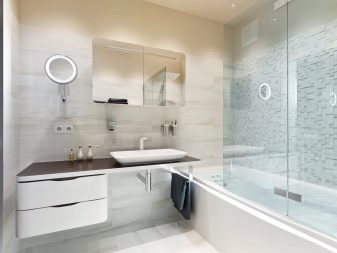
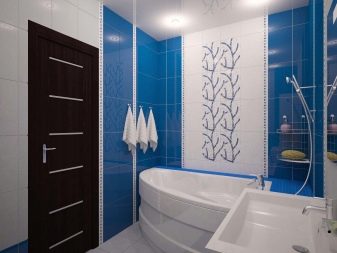
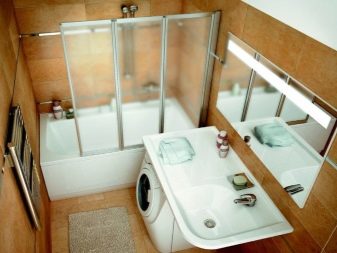
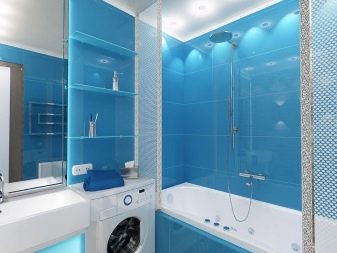
Standard options
Consider the possible options for placing furniture and plumbing in the room, taking into account what kind of plumbing will be placed.
With bathroom
A simple option is the bath is placed along one of the long walls of the bathroom, the rest of the plumbing and furniture is along the remaining long wall and opposite the door.
You can also arrange the font along the width of the bathroom. True, for this you will have to replace the bathtub with a smaller analog or displace the wall separating the bathroom and toilet. In this case, on the long side, you can place a washing machine and a sink, and on the side closer to the entrance, put a cabinet or towel holder.
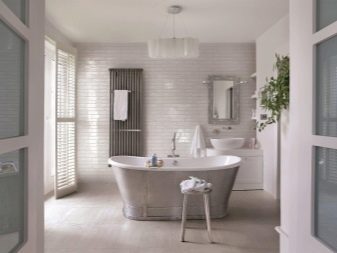
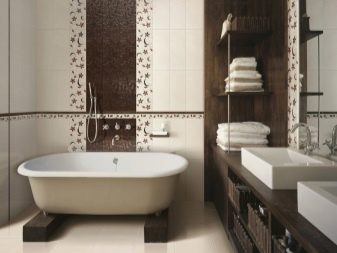
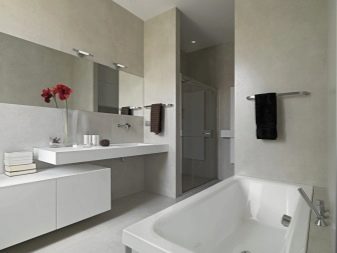
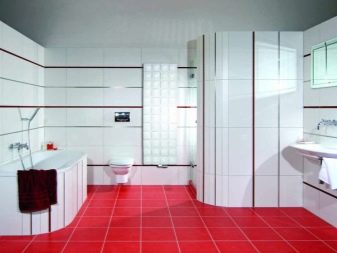
For small spaces are popular corner baths. They are installed in one of the far corners. In the second, a sink can be located.
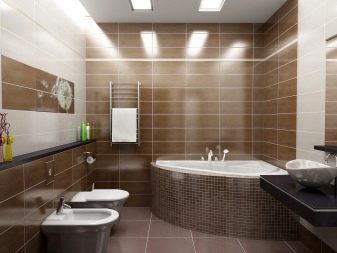
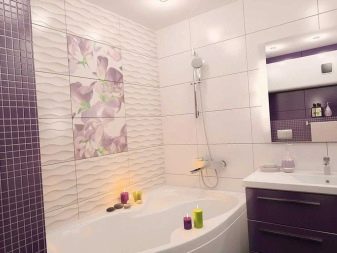
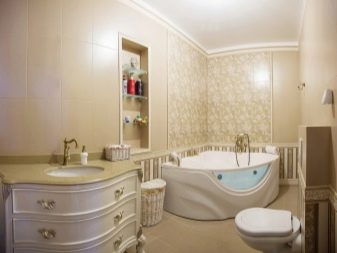
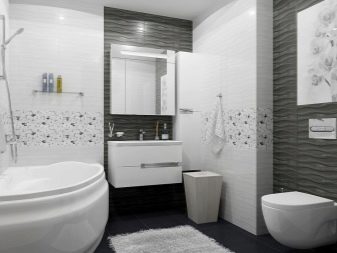
With shower
The shower cabin is most often located in one of the corners of the bathroom or along the wall. The rest of the space is occupied by a toilet and a sink (that is, opposite the shower box). There is room on the side for a washing machine or furniture.
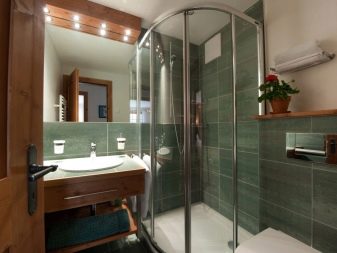
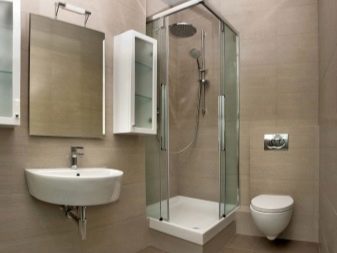
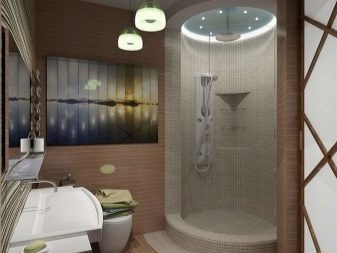
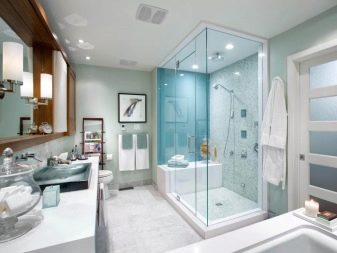
Non-standard
With bath and shower at the same time
Large bathrooms can accommodate both a bathroom and a booth. They can be located along the long wall of the room, on the contrary - a sink, a dressing table, a washing machine. Options with partitions or niches are popular. In the latter, a shower stall is organized, and a bath is mounted behind the partition.
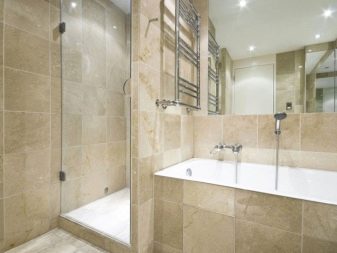
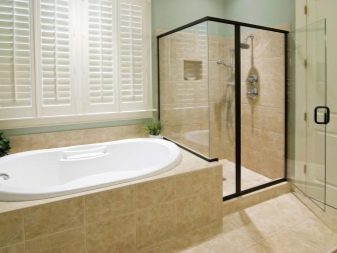
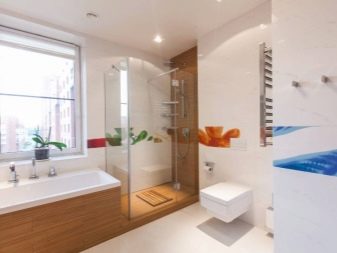
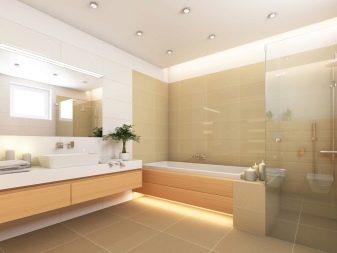
The use of the corner bath is ergonomic, then a shower stall fits along one of the walls. The remaining space is enough for a sink, furniture.
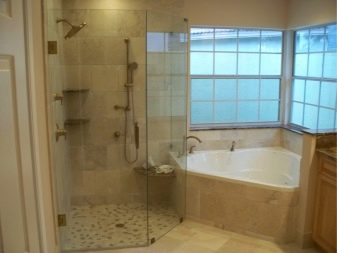
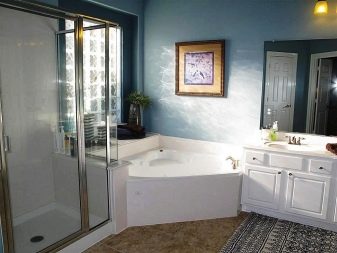
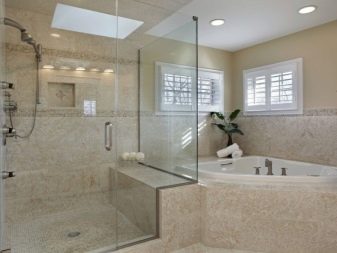
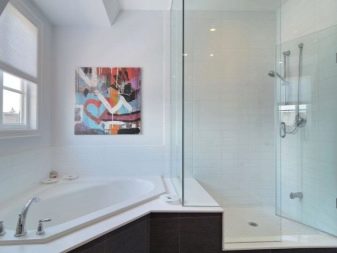
With sauna
You can organize a sauna in an ordinary apartment if you purchase a special shower box with a sauna function. It is quite massive, so in small bathrooms it is installed along the width of the room, that is, opposite the entrance.
On the long side, there is room for a bath - small or corner. If the bathtub does not fit (or only the bathtub fits), then a sink and furniture are placed along the wall.
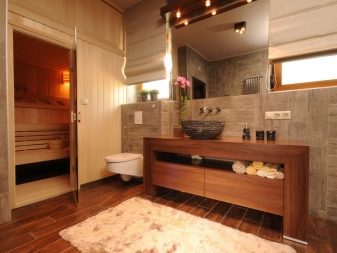
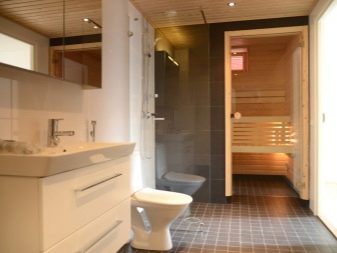
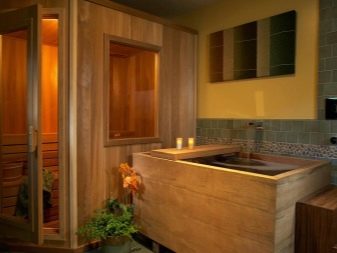
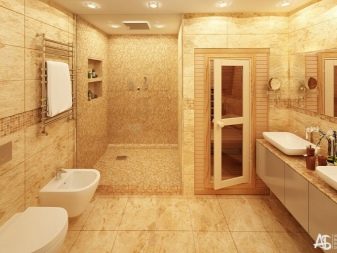
Without sink
In small rooms, you often have to give up the sink. But in this case, a bath is required. Typically, this is a corner bowl. If we are talking about a combined bathroom, then a partition borders on the bathroom. Behind her is a toilet. On the other side is furniture or appliances.
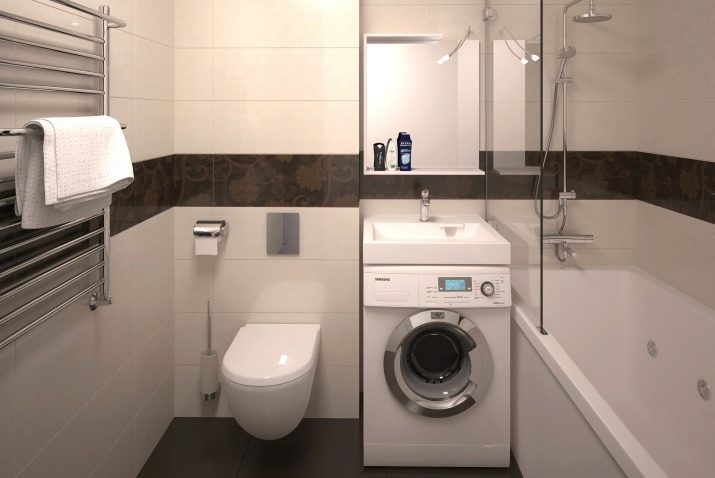
Finishing materials
Ceramics
One of the popular options is ceramic tiles. It is a reliable, environmentally friendly and durable material. It is characterized by moisture resistance and hygiene, which is important for a bathroom.
The tile remains attractive for a long time, only the seams between it can cause a problem. But they are also easy to update using a special composition. It is worth noting the maintainability of the material - if an individual element is damaged, it can be replaced. There is no need to make a complete renovation of the wall.
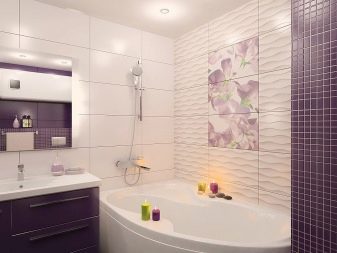
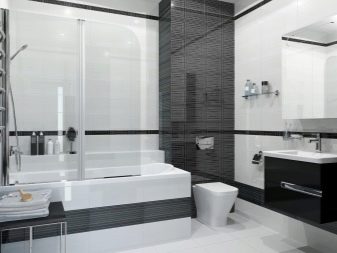
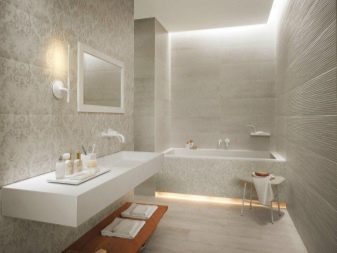
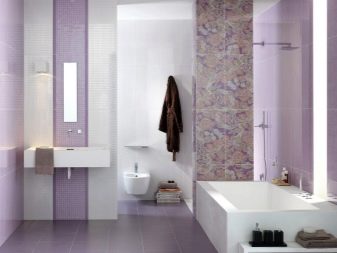
There is also a special tile for the floor. It is more durable than what is intended for walls. Another important point is that floor tiles are never smooth, but have a rough or grooved surface for safety. Under any floor tiles, you can install a warm floor system. This is very convenient since the material itself is quite cold.
The main disadvantage of the tile is the high cost of the material itself and the work. Tiling requires special skills and professional tools, so it is preferable to entrust this process to a professional.
It is also necessary to carry out a large amount of preparatory work - leveling the walls and floor. Tiling is not the best option for new buildings, since when the house shrinks, the material can deform and crack.
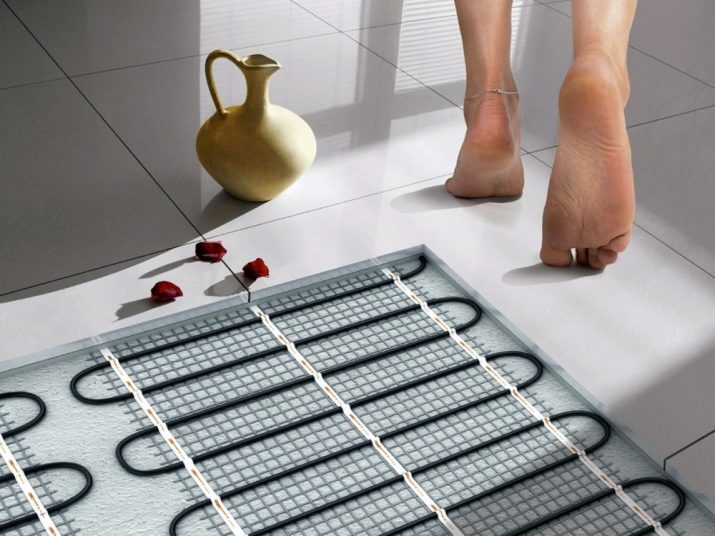
Dye
Another option for decorating the walls in the bathroom is painting them. Modern paints have many shades and textures. Mixing of paints is available, their tinting to obtain smooth transitions from a more delicate to a more saturated shade.
Painting the walls is also convenient because the resulting coating is moisture resistant, easy to clean, especially if it is smooth surfaces. In addition, the material itself is cheaper compared to tiles, and you can paint the walls yourself if you wish. True, the preparatory work will also have to be done - this is leveling and degreasing walls, improving their adhesion.
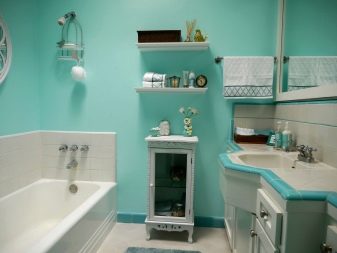
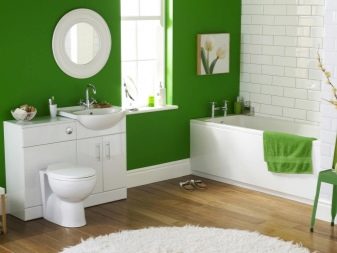
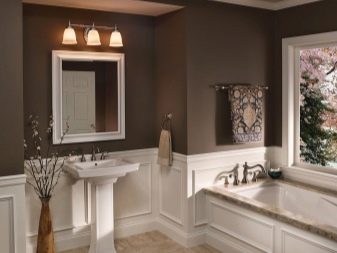
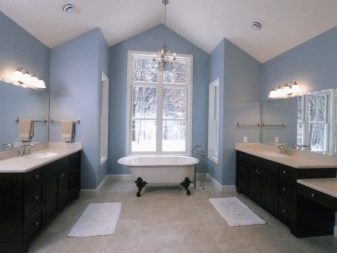
The following types of paints are usually used for bathrooms.
Water-based
They are latex and acrylate based. The second option is more affordable, suitable for use in rooms with high humidity. However, it is best not to apply the material directly near showers, bathtubs and faucets.
Latex-based water emulsion forms a strong moisture-proof film on the surface, can slightly smooth out small surface irregularities. One of the advantages of water-based paints is the absence of an unpleasant odor during application and drying.
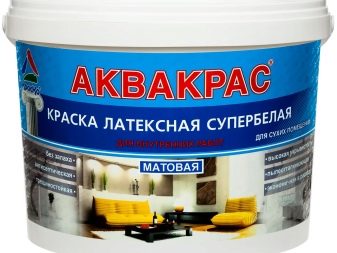
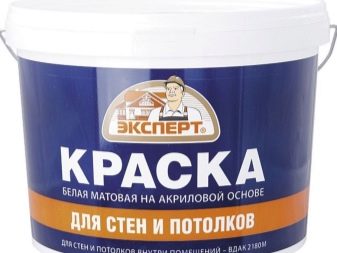
Alkyd
These paints are based on organic solvents, and therefore have an unpleasant chemical odor until they are completely dry. In their consistency they resemble oil paints, however, in contrast to them, they can form not only glossy, but also matte and semi-matt surfaces.
Among the advantages are ease of use, affordable price. However, when alkyd paint is applied, all surface defects become apparent, in addition, over time, the painted surface can shine.
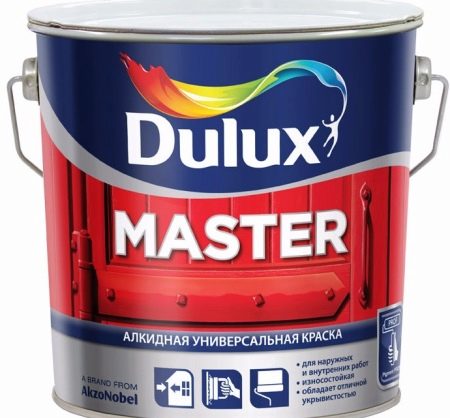
Silicate
Suitable for rooms with high humidity, since mold and mildew do not form on the surface painted with silicate paints. In addition, it has a high vapor permeability, therefore the greenhouse effect is excluded. Paint forms strong, durable coating... Of the minuses - high toxicity of paint, therefore, you need to work in protective clothing and a respirator. It is impossible to stay indoors until the paint is completely dry.
Finally, it is worth remembering that no other paint is applied to the surface of the silicate paint. If you want to change the design of the room, you will have to completely clean off the old layer.
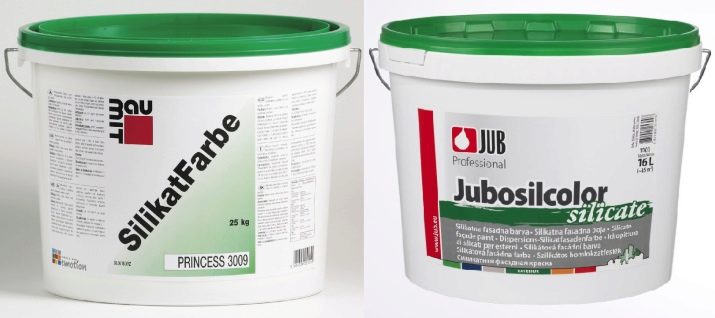
Silicone
The painted surface is completely waterproof, even in the form of steam. It is recommended to use silicone-based formulations only if if the room has a powerful ventilation system.
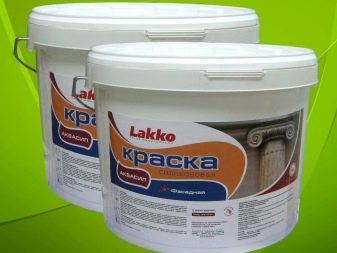
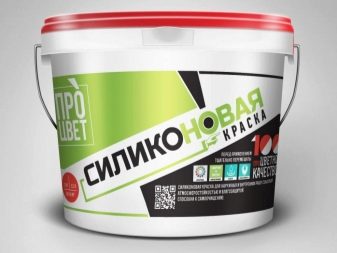
Chlorinated rubber
It is used for painting the inner surface of the pool bowl, therefore it is characterized by increased moisture resistance. Like silicone, it is used only in rooms with good ventilation. The material is very picky about the work surface - it must be thoroughly cleaned and degreased.
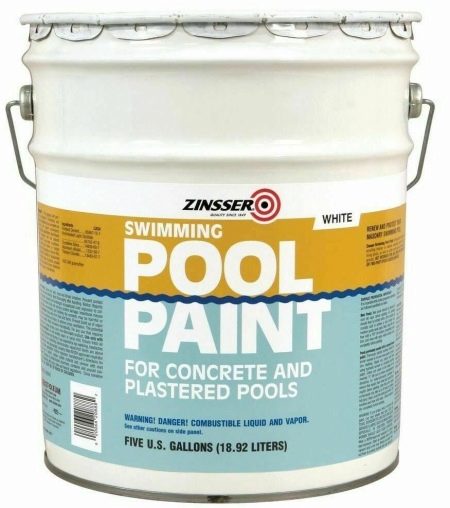
Decorative plaster
Another modern and attractive finishing material for the bathroom is decorative plaster. There are moisture resistant, so-called facade options. Other benefits include - visual appeal, diverse color and textured varieties of coatings, ease of care, high aesthetic qualities.
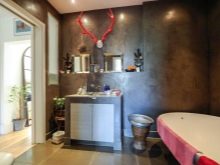
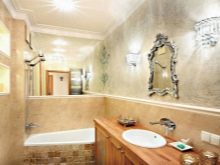
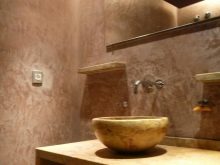
Wallpaper
You can also glue the wallpaper in the bathroom. True, you need to choose special - the product label should say “moisture resistant” or “super moisture resistant, abrasion resistant”. Usually this corresponds to a graphic sign - three wavy lines.
Before pasting, it is recommended to prime the walls with a composition with antiseptics, and use a special glue with antibacterial additives. This will help prevent mold and mildew from growing.
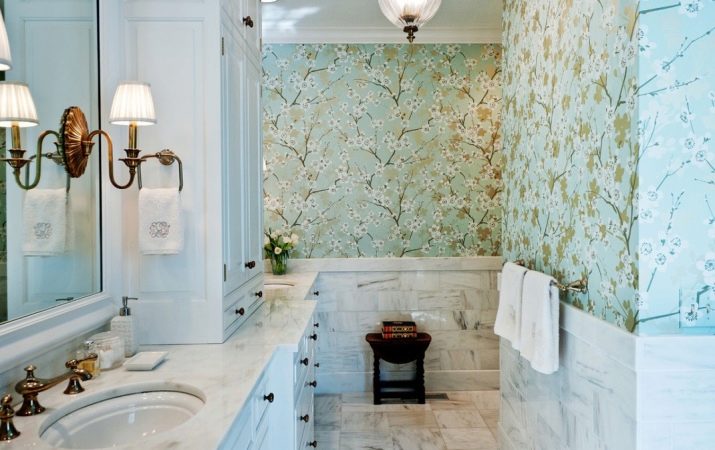
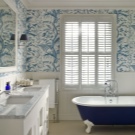
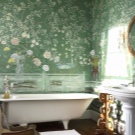
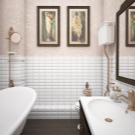
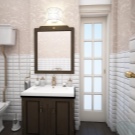
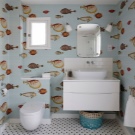
PVC panels
PVC panels are very popular for decoration. These are plastic products that are attached to a special crate (nailed to the walls of the bath). Thereby you don't have to worry about careful preparation of the walls and leveling out small errors. Due to the crate and panels, they will be hidden. However, the size of the room will also decrease slightly, but visually this is usually not noticeable, it is not felt during the operation of the bathroom.
The popularity of wall panels is also due to their affordability, a variety of designs, and an attractive appearance of the bathroom after renovation. Thanks to the ventilation system placed between the walls of the bathroom and the panels, the risk of bacteria and fungi is excluded.
Panels are painted in a certain color, can have a pattern applied to the surface, and also imitate tiles, wood, stone. They are easy to care for and can be placed near the bathroom, sink.
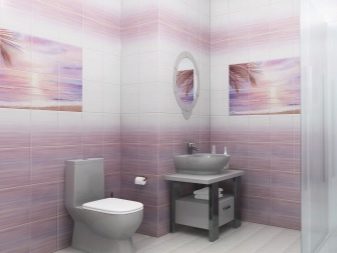
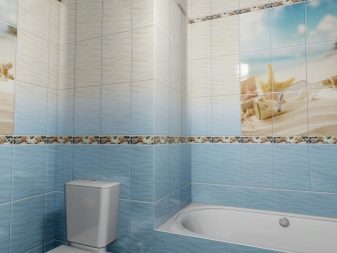
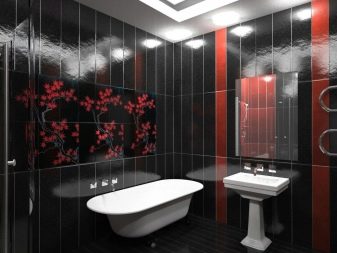
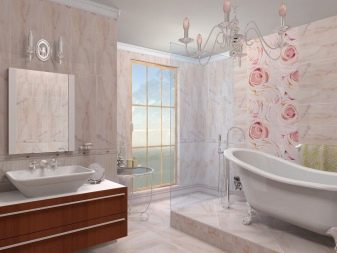
Stone
A luxury material is considered to be a stone - artificial or natural. It is clear that the latter is heavier, more expensive and fixed on a cement base. For the bathroom, you can consider flagstone (natural flagstone sawn into thin plates), since it is less hygroscopic. However, he still needs additional protection - the laid flagstone is varnished in 2 layers.
Natural stone is an expensive material that is difficult to install. If you like the effect, it is better to use an artificial analogue. It is a composite material that accurately imitates natural stone surfaces.
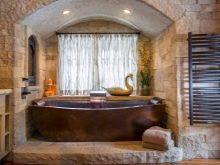
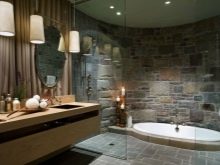
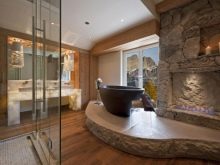
Artificial elements are sold as a set - they have different shapes and sizes, which gives the effect of a natural material, but they fit together (a guarantee of easier installation than laying a natural analogue).
Stone is rarely used to decorate a complete bathroom. There is a high probability of getting a gloomy and uncomfortable room. A stone laid out in fragments looks much more impressive. You can combine it with wood, decorative plaster, painting.
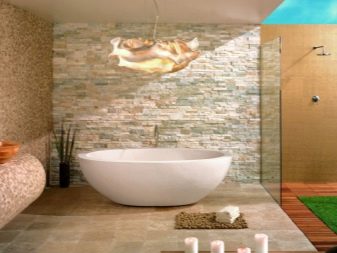
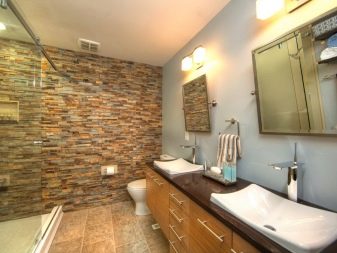
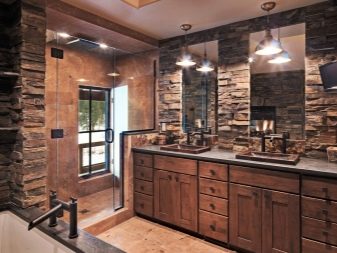
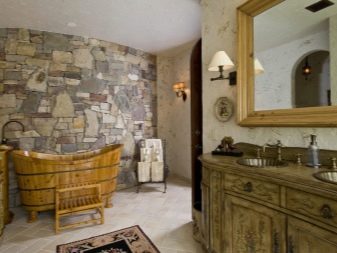
Wood
If you want to achieve an atmosphere of comfort and warmth in the bathroom, it makes sense to consider options for wood finishes (a more democratic option is lining, MDF). You need to choose oak, larch, beech as more moisture resistant species. However, such material requires regular maintenance - the application of moisture-proof coatings. Even so, you shouldn't use wooden elements in the immediate vicinity of water.
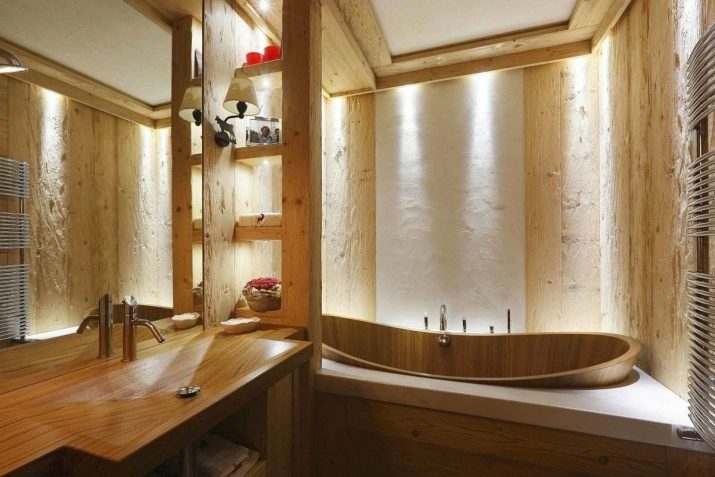
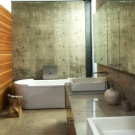
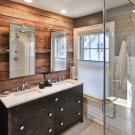
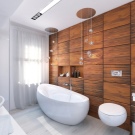
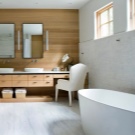
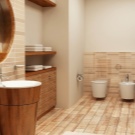
Color palette
The most common option is light beige shades. However, you should not consider the option of a totally white room, it will be psychologically difficult to be in it.
Among the successful options are beige, milky, coffee shades, all colors of water (from blue to blue and turquoise), olive, green. It is noteworthy that these colors combine well with each other. You can use up to 3-4 shades close in color, for example, 2 close beige, chocolate and golden as an accent.
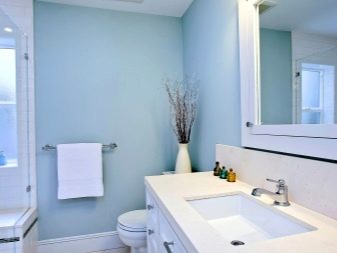
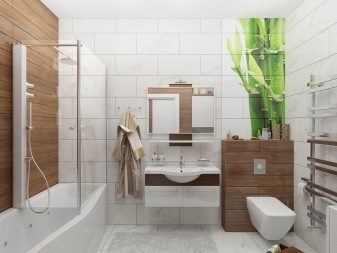
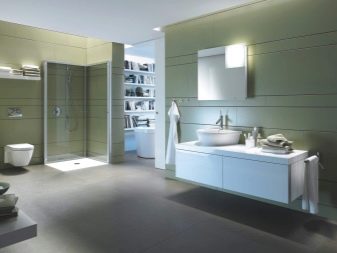
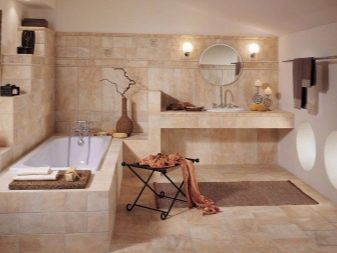
Suitable in the bathroom and contrast solutions, however, you should avoid too active colors (black, red). After all, the bathroom is a place of relaxation. It is better to replace them with a more neutral option (for example, use gray instead of black) or dose (use red accessories).
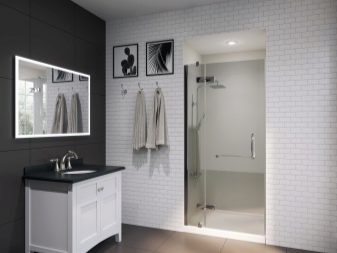
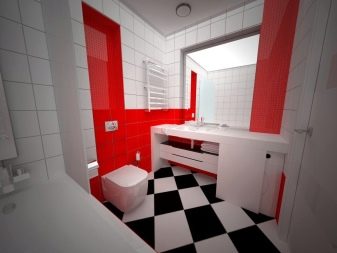
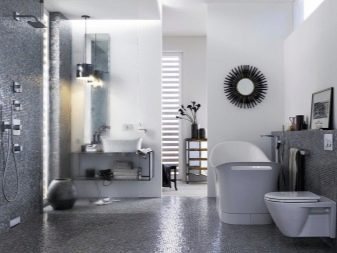
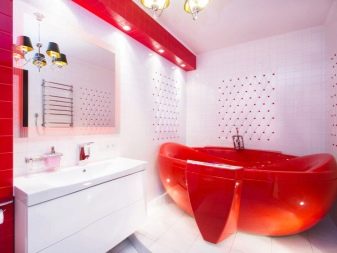
Styles
All the variety of styles for the bathroom can be divided into 2 types - design in classic and modern styles.
Classic
For large and medium sized bathrooms, we recommend classic styles... They are characterized by: the presence of a large bath, luxurious plumbing, rounded shapes, calm color combinations. Textiles and accessories help to complement the interior - a mirror in an intricate frame, fluffy towels, rugs, flowers and other decorative elements.
Ceramic tiles, stone, decorative plaster are optimal as finishing materials. Complex textures, stucco molding are welcome.
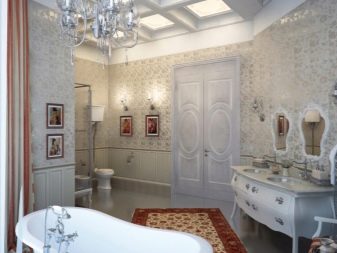
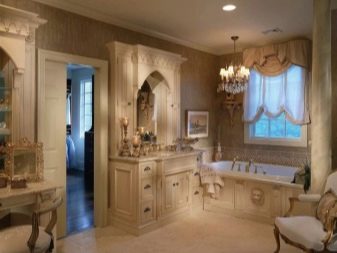
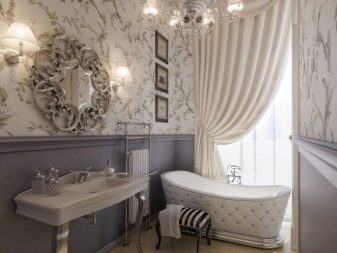
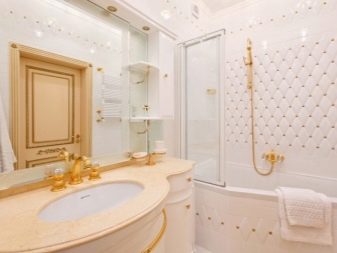
One of the brightest representatives of the classic style can be called English interior. Its characteristic features are stiffness, laconic luxury, expensive materials and simplicity of forms. Tiles are mainly used in wall decoration. A must-have furniture in classic brown shades and a large, rounded claw-foot bathtub.
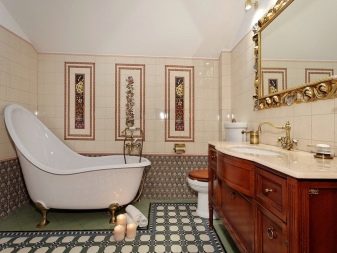
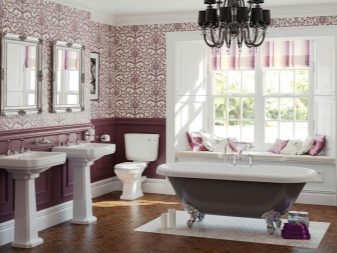
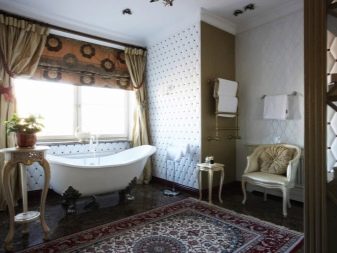
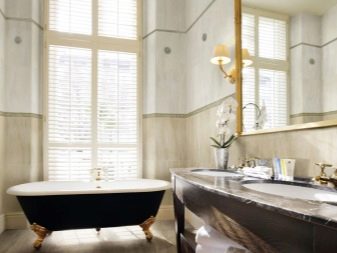
If such an interior seems too luxurious and prim, you can consider Provence style. This is a kind of country style, that is, a free country style. When creating it, you cannot do without the use of natural textures (plaster, stone, wood), bright floral and floral ornaments (for example, in textiles).Preferred colors are beige, soft lemon, coffee and olive shades.
A large rounded bathtub is required (if possible, it does not need to be placed along the wall), refined, but not pretentious mixers. Cozy wooden mini-chests of drawers, shelves, shelves will fit well here. Better if they are artificially aged.
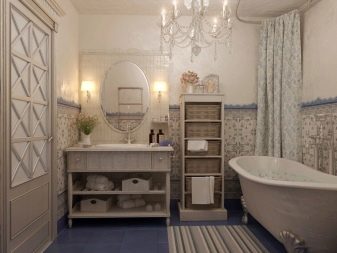
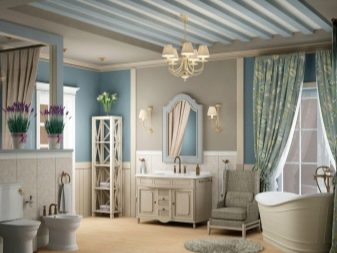
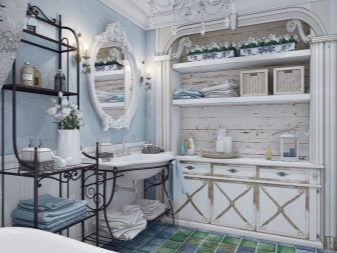
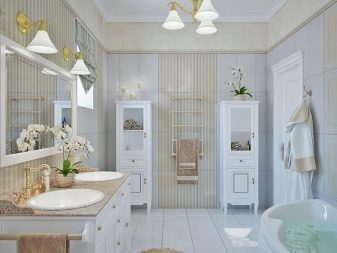
Modern
For small bathrooms, it is preferable to choose fashionable modern styles. They can eliminate the traditional hot tub and replace it with a shower. Modern style is minimalism, functionality, simple shapes and colors. However, the latter combine both the unity of color and contrast.
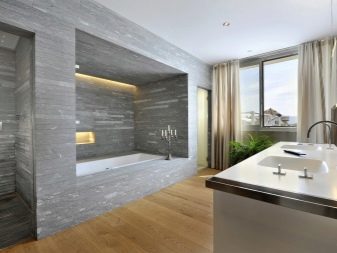
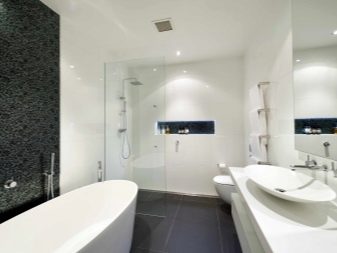
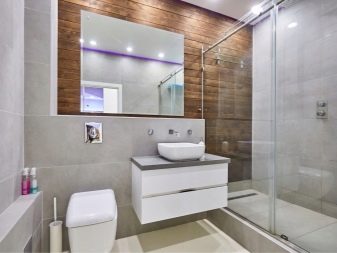
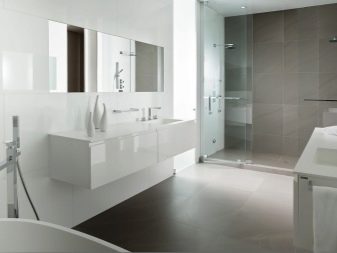
Talking about style high tech, then to decorate the room you can use paint, wall panels, tiles. To divide the room into zones (especially if it is a combined bathroom), low partitions, including those made of frosted glass, will help.
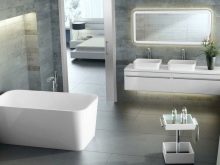
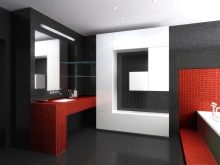
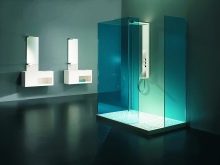
Among the modern interiors, it is worth highlighting the design in style loft... You will have to work hard on decorating the walls of the room, since you need to achieve similarities with a production facility. Brickwork (ideally dilapidated), rough concrete walls, protruding pipes and metal beams under the ceiling - all this will become a "sign" of the loft interior. Use a walk-in shower or a small tub with an unusual shape. The main thing is to get away from luxury and excesses.
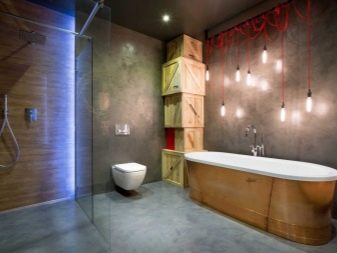
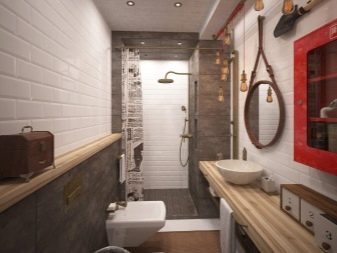
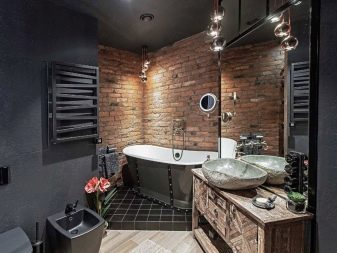
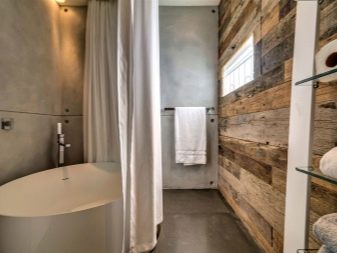
Relevant for the bathroom is and sea style. As a rule, these are light-colored wall panels or tiles. Perhaps their combination with blue, blue, turquoise shades. In a word, the color scheme of such a bathroom invariably resembles the surface of the sea. For greater effect, sometimes seascapes and images of the underwater world are laid out on the wall.
Both a familiar bathtub and a shower stall can be used. Plumbing is usually light in color.
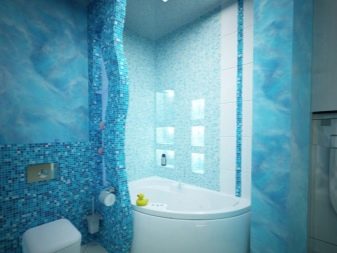
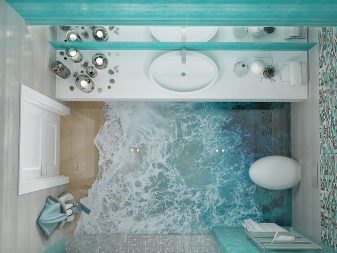
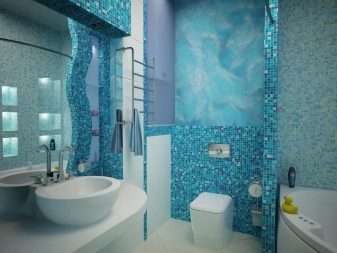
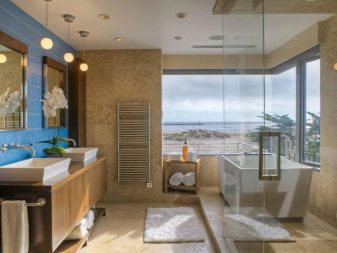
The choice of plumbing
In most cases, plumbing equipment is porcelain and earthenware. The latter is an affordable option, reliable, attractive, but the earthenware surface is quite porous.
In the manufacture of porcelain sanitary ware, a qualitatively different type of firing is used, due to which the material is smoother, and therefore more hygienic, easy to maintain. Porcelain sanitary ware is heavier, more expensive, heats up quickly and retains heat. However, both porcelain and faience are fragile items. If heavy objects hit them, cracks and chips cannot be avoided.
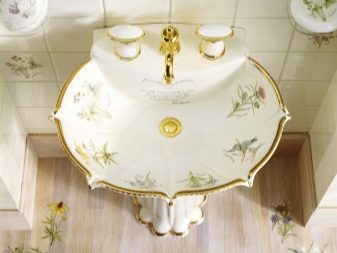
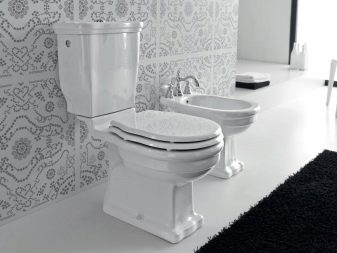
Products made of composite material are considered more durable. Outwardly, they resemble a granite surface, but have a characteristic luster. Resistant to mechanical damage, easy to clean. Among the disadvantages is the high cost.
Glass toilets are the originality and uniqueness of the bathroom, they look best in modern interiors. Despite its apparent fragility, glass surpasses faience and porcelain in terms of strength. Minus "is the need for careful maintenance of such plumbing, the slightest smudges and stains are visible on the surface.
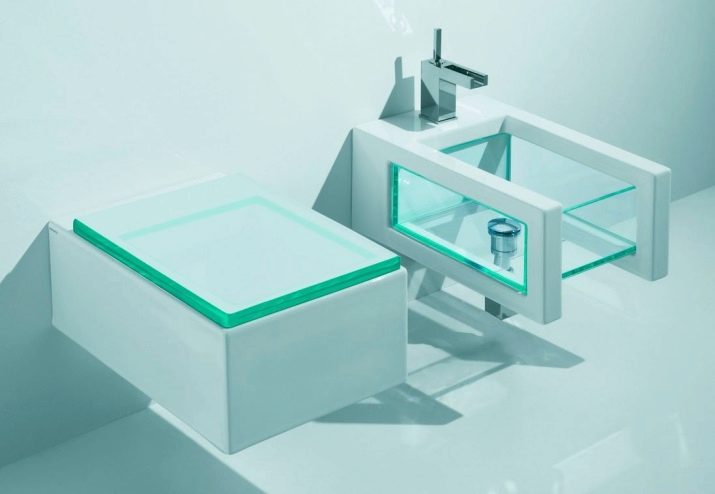
When choosing a sink, first of all, you need to evaluate its compatibility with the type of mixer. They can be different in the shape of the bowl - a tulip, a cascade. By type of fastening - wall, floor. For small bathrooms, corner and built-in models are optimal.
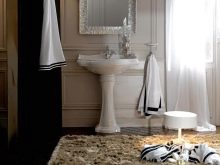
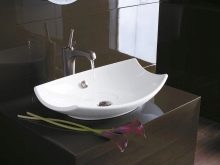
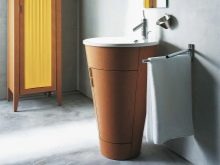
When choosing a toilet, it is useful to think in advance what functionality you need. These can be options with a bidet, hygienic shower and many other additional options. Suspended and floor models are distinguished by the type of attachment.
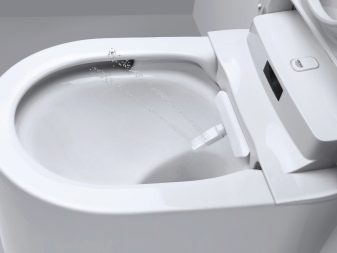
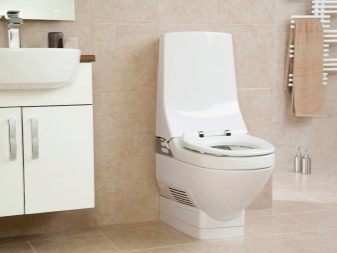
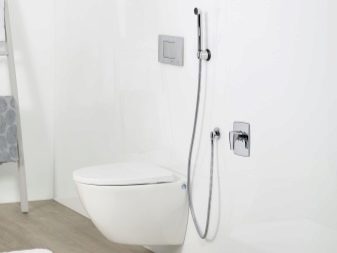
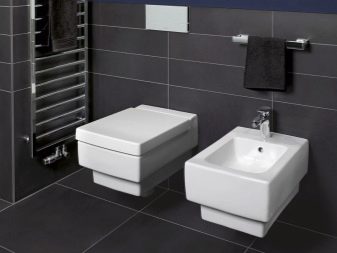
As with buying a sink, first of all make sure that the chosen model is suitable for the type of sewage system in your house (namely, at what angle the sewer pipe is located). Otherwise, additional preparatory work lies ahead. If you have water meters installed, then a toilet with a double flush will be more economical to use.
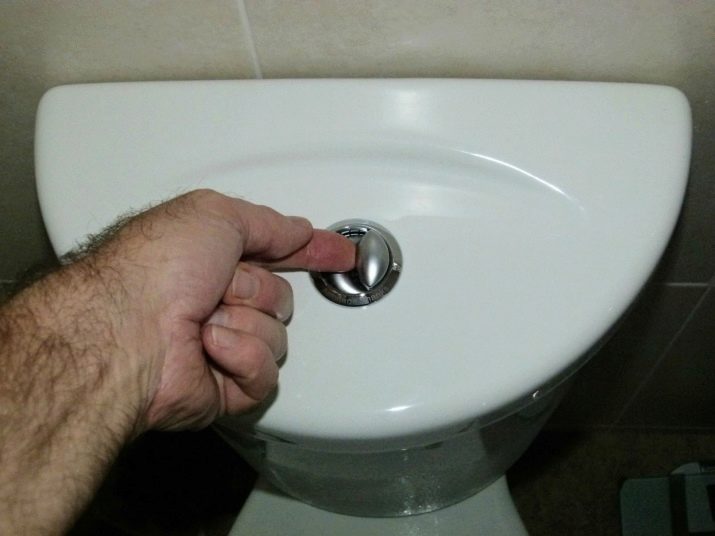
Bathtubs and shower trays are made of the same materials. A popular option is acrylic. The average service life is 25 years, the material is reliable, practical, attractive in appearance. It is the acrylic bowls that have the most design options. Standard sizes - 120-140 cm (small baths), 150-170 cm (standard), from 170 cm - large.
When buying, preference should be given injection molding products. They are more reliable than those made by the extrusion method. It is worth abandoning the purchase of the combined option right away. These are plastic fonts covered with acrylic on top. They deform, break, do not withstand the weight of users and temperature changes. A stronger and more durable type of acrylic - kvaril... This is the same material, but with ceramic chips in the composition.
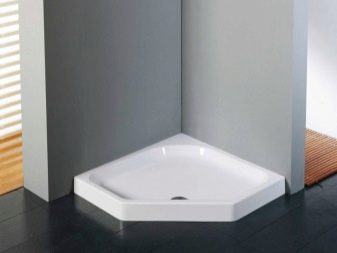
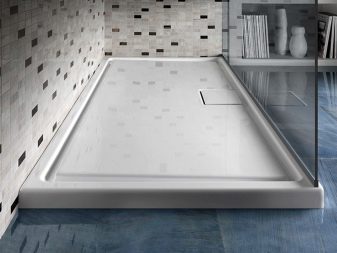
Another "running" material is cast iron. It has an even longer service life - up to 50 years, is not afraid of mechanical damage, does not deform. However, due to the large weight, it may be difficult to mount and install a bathtub or shower tray. In addition, cast iron is a non-plastic material, so the shape of the products is usually standard - square, rectangle. The material keeps heat well and is more expensive than acrylic.
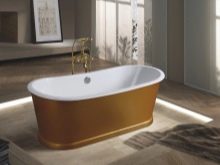
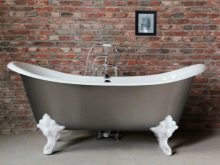
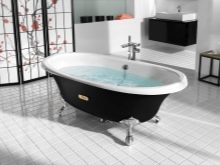
The middle between acrylic and cast iron is steel bowls. They are usually covered with enamel from the inside. Service life - up to 15 years, it is a light material, which is the reason for possible deformation of products and their rattling when collecting water.
Steel has a higher thermal conductivity, so the water in such a font will cool faster. Over time, cracks and chips appear on the enamel, after which the operation of the product becomes undesirable.

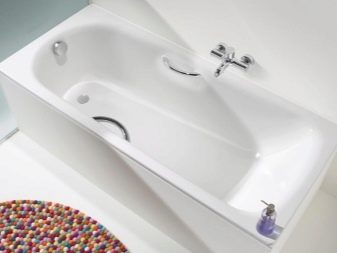
Ceramic bathtubs and trays look stylish. Due to their massiveness, they do not vibrate, are stable, and easy to clean. However, even a slight mechanical stress can lead to the splitting of the material.
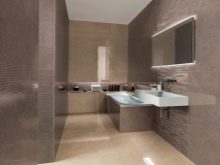
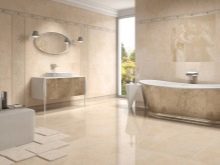
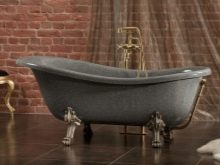
Finally, tubs and trays can be manufactured made of artificial stone. The material has considerable weight, imitates any stone surface, looks especially harmonious in spacious rooms, bringing in them notes of luxury and respectability.
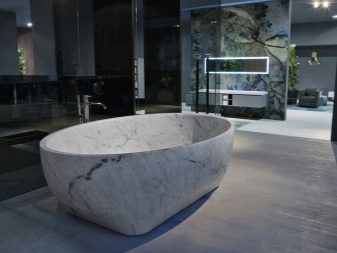
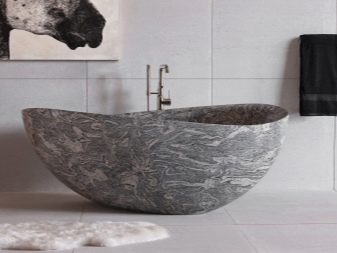
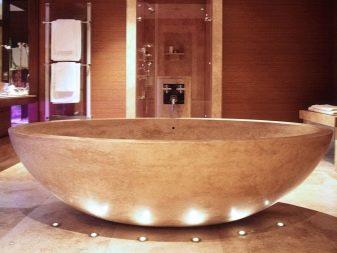
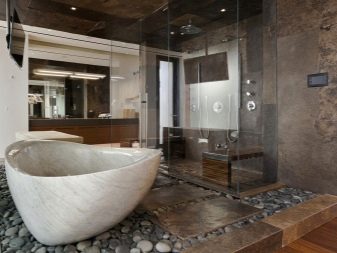
How much distance should be left between objects?
For comfortable use, it is important to leave sufficient distance between objects in the bathroom. Minimum distance:
- between objects and plumbing, as well as between objects and the door - 75 cm;
- there should be at least 35-45 cm between the toilet and bidet;
- between the walls of the bathroom (or furniture, other plumbing fixtures) and the toilet - at least 35-45 cm;
- there must be at least 30 cm of space between the shower and the bath (or sink).
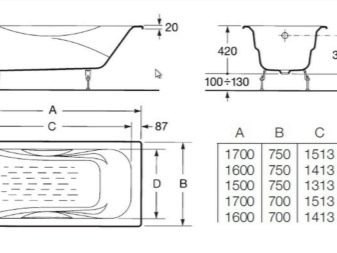
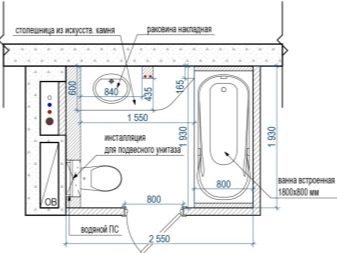
Non-standard placement
In small bathrooms, sometimes you have to "trick" to accommodate all the necessary plumbing and furniture. You can reduce the space between the shower stall and the sink by placing them close to each other. The main thing is that the sink does not interfere with the opening of the booth door.
You can reduce the minimum distance between plumbing to 50 cm, but not less. You can save space by installing a sink above the bathtub.
However, it is not always necessary to deviate from the accepted standards when placing plumbing because of the small size of the bathroom. Sometimes these are quite spacious rooms, but located in non-standard rooms - in the attic, under the stairs.
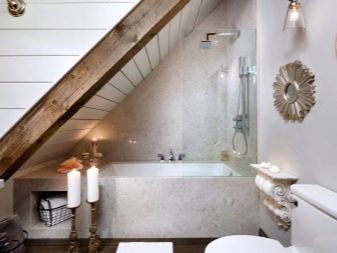
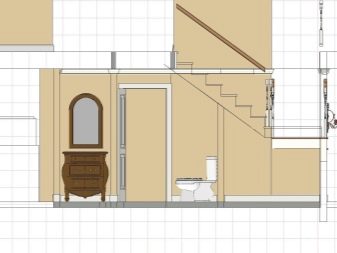
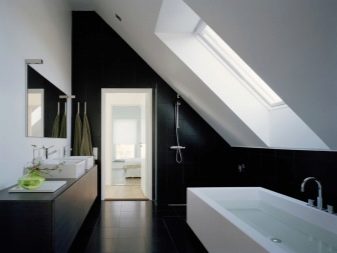
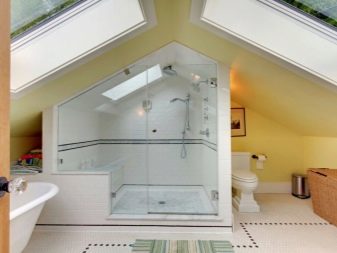
How to equip?
The organization of the space is carried out taking into account the size and features of the location of communications.
Placement of furniture
First you need to decide what kind of furniture you need. Usually these are cabinets under the sink and above the sink, pencil cases. In spacious bathrooms, you can fit a bookcase, and in small bathrooms it is better to replace it with wall shelves, an organizer, drawer, console are also suitable.
Ergonomics and convenience are combined in a small open rack towel holder.
Shelves are usually located at the bottom, and towel holders at the top.If size allows, it will be convenient to have a small bench or lounge chair in the bathroom.
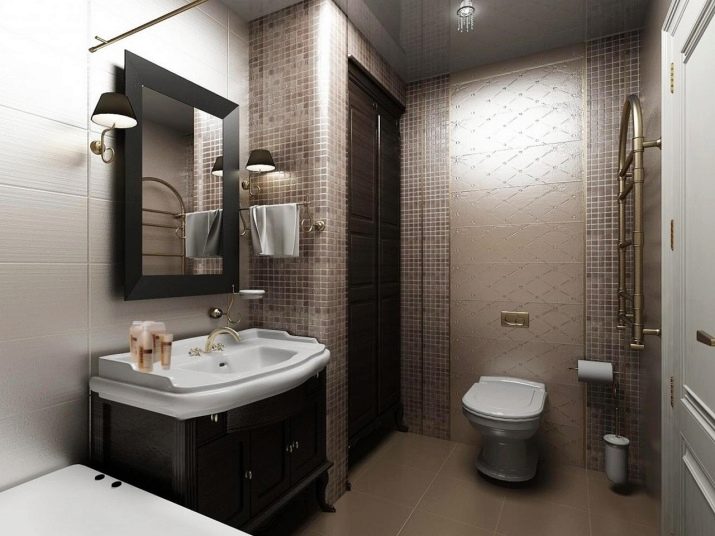
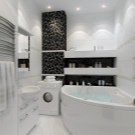
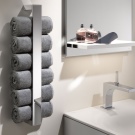
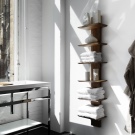
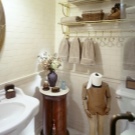
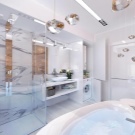
Decor and accessories
The details allow to give the interior sophistication and uniqueness in many respects. This is a mirror, a soap holder, glasses for toothbrushes, a painting, a waterproof watch, a radio. The simpler the interior, the less accessories it should have.
For spacious interiors in a classic style, on the contrary, the use of wicker baskets, candelabra, decorative elements is encouraged.
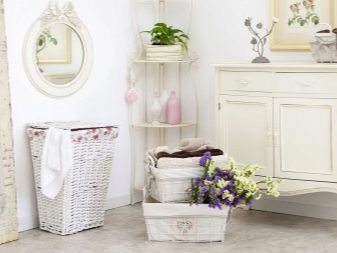
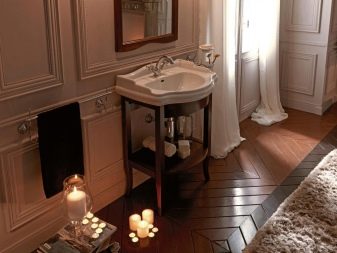
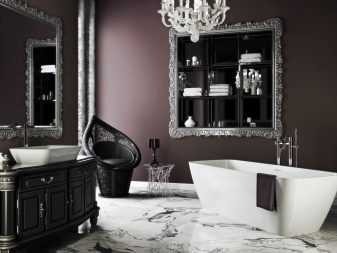
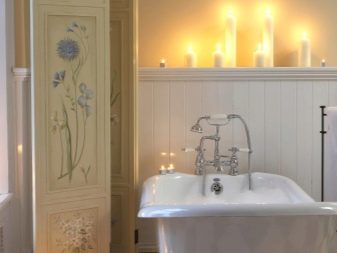
Blinds and curtains
Bath screens can not only close the font or shower stall, but also serve for zoning the room. They can be made of moisture-resistant fabric materials, plastic, glass.
For small rooms, it is better to use fabric curtains, vertical blinds or roller shutters.
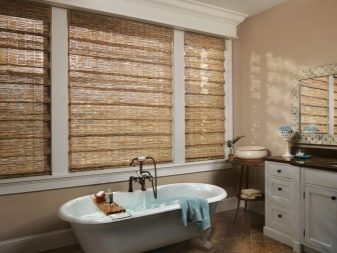
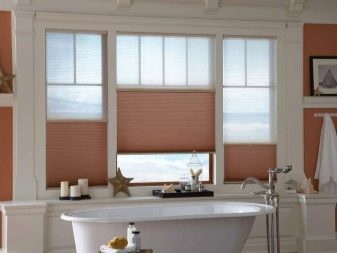
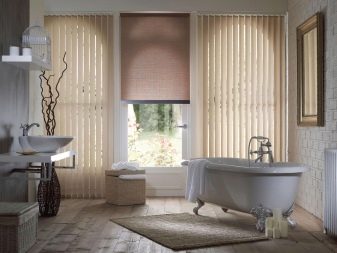
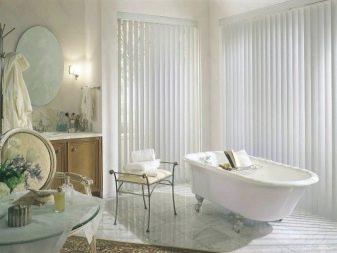
Lighting
The choice of lighting features is largely determined by the size and style of the bathroom. For a small bath, a chandelier in the center of the room or spotlights along 2 walls are enough.
For more spacious bathrooms, it is recommended to supplement the chandelier in the center of the room with a separate lamp in the sink and dressing table area.
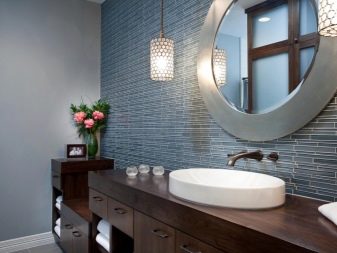
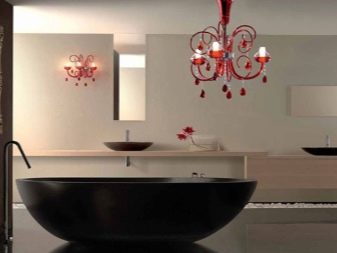
For large spa-style bathrooms, multiple lighting levels are recommended. To create a more relaxing environment, you can leave only the bottom light, creating an intimate twilight.
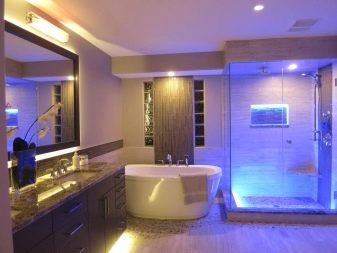
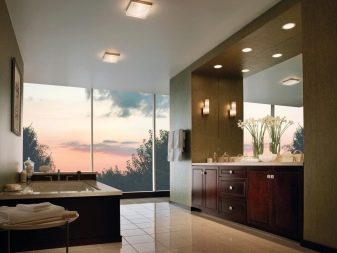
Open chandeliers are only suitable for bathrooms with high ceilings. If the room is small, it is better to choose built-in ceiling or wall lights. Floor lamps usually play a decorative role. By themselves, they will not give the required amount of light, therefore they are combined with standard lighting schemes.
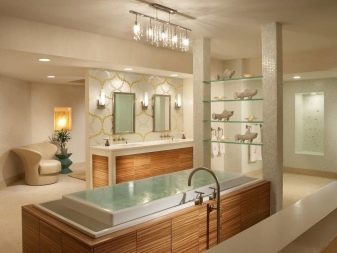
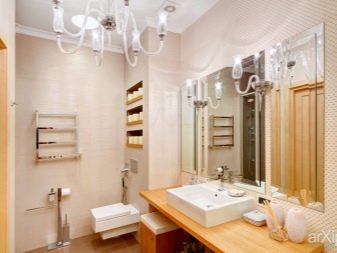
Unusual bathroom design and decoration ideas
- An eclectic and luxurious bathroom option - a combination of snow-white walls, marble bathroom trim, turning into floor decoration, crystal chandelier and oriental decor.
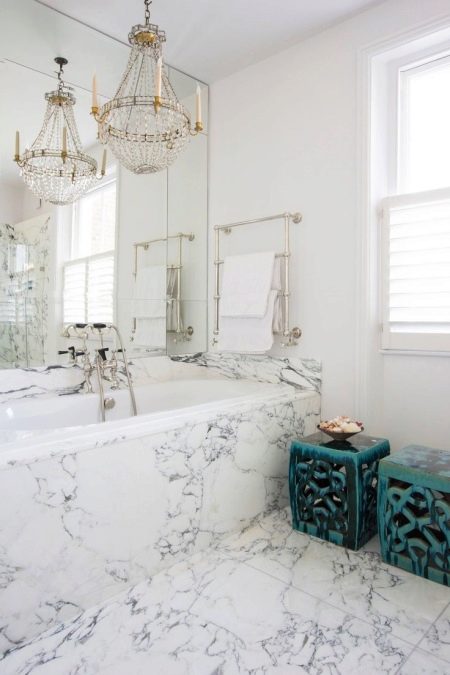
- Spacious room in classic style... Wooden floors, furniture and elements add warmth and comfort to the interior. For older people, you can attach a step to the bathroom.
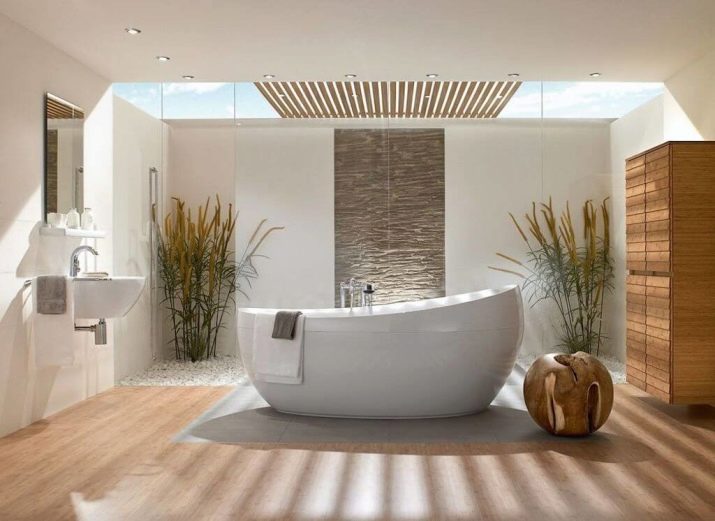
Examples of ready-made solutions
It is not necessary to draw up a design project for a bathroom. You can use a ready-made solution - a bathroom decor, thought out to the smallest detail. Such options are presented by many stores of building and finishing materials. The counter usually displays a pre-assembled bathtub, including wall finishes, plumbing fixtures, furniture, and even accessories. The buyer can purchase a ready-made kit or its individual elements. Let's consider real examples of such kits.
- Option with wall panels, standard bathtub and vanity unit with deep washbasin.
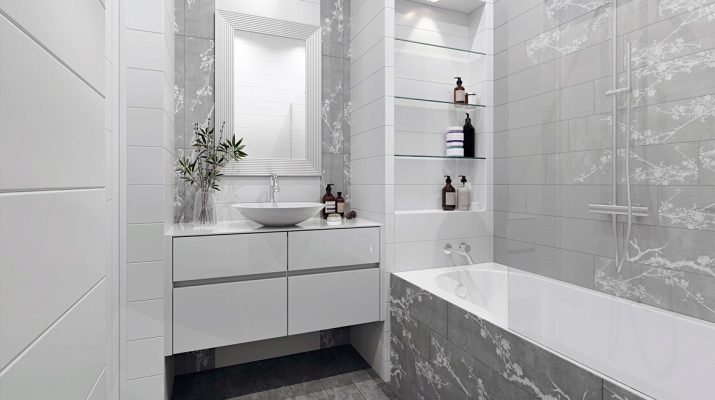
- A ready-made complex with a shower corner for a combined bathroom. Wall decoration material - PVC panels.
